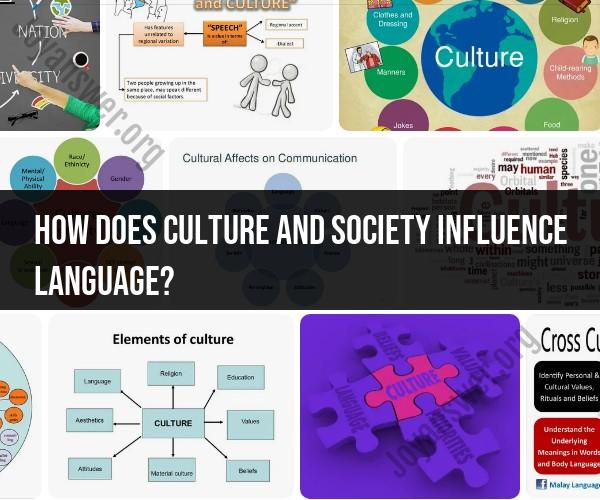How does culture and society influence language?
Culture and society have a profound influence on language, and this influence can be observed in various ways. Language is not merely a tool for communication; it is also a reflection of the values, beliefs, and social norms of a particular group of people. Here are some key insights into how culture and society influence language:
Vocabulary and Expressions: Language reflects the culture's values, history, and environment. Different cultures may have unique words and expressions that are tied to their experiences, traditions, and beliefs. For example, there may be words in one language that have no direct translation in another because they describe something specific to a particular culture.
Social Hierarchy and Politeness: The structure of a language, including how people address each other and use honorifics or titles, often mirrors the social hierarchy in a society. In many cultures, there are formal and informal ways of addressing people, and this can be a reflection of respect and social norms.
Gender and Language: Cultural expectations about gender roles and identity can influence language. Many languages have gender-specific words or forms of address, and these can perpetuate societal gender norms. Efforts are being made in some cultures to introduce more gender-neutral language to promote equality.
Cultural Norms and Taboos: Language often reflects cultural norms and taboos. Certain words or topics may be considered inappropriate or offensive in one culture but perfectly acceptable in another. The use of euphemisms and politically correct language can also be influenced by societal norms.
Idioms and Metaphors: Cultural references, historical events, and societal metaphors are often embedded in idiomatic expressions. Understanding these idioms requires knowledge of the culture and its history.
Cultural Values: The values held by a society, such as individualism vs. collectivism, can affect language. Some languages may place more emphasis on collective pronouns and expressions, while others may prioritize individuality and personal agency in their language.
Multilingualism: In multicultural societies, the coexistence of multiple languages can influence linguistic borrowing and code-switching. People may integrate words and phrases from other languages into their speech, creating a linguistic fusion that reflects cultural diversity.
Religious Influence: In cultures where religion plays a significant role, language may contain religious terminology and expressions. This can extend to daily greetings, idioms, and even legal and administrative language.
Historical and Political Events: Historical events, conquests, colonization, and political changes can leave lasting marks on a language. The conquerors' language often influences the conquered, and the language may evolve to reflect the new sociopolitical context.
Media and Globalization: In today's interconnected world, media, technology, and globalization have a profound impact on language. Words, phrases, and cultural references from one part of the world can quickly spread to others through the media and the internet.
In summary, language is deeply intertwined with culture and society. It reflects the values, norms, and historical experiences of a particular group of people. Understanding the influence of culture and society on language is essential for effective cross-cultural communication and for appreciating the rich diversity of human languages and cultures.
The Interplay Between Culture, Society, and Language
Culture, society, and language are intricately intertwined, each influencing and shaping the others in a dynamic interplay. Culture, encompassing the shared beliefs, values, and customs of a group, finds expression through language, the medium through which these ideas are communicated and perpetuated. Society, the structured network of relationships within a community, relies on language to establish norms, maintain order, and facilitate interactions.
Language, in turn, reflects and reinforces cultural values and societal structures. The vocabulary, grammar, and nuances of a language embody the cultural worldview of its speakers, shaping their perceptions and understanding of the world. Language also serves as a marker of social identity, delineating groups and establishing hierarchies.
How Culture Shapes Language: Examples from Around the World
The influence of culture on language is evident in various aspects, from the richness of vocabulary for specific cultural domains to the subtle nuances of expression. For instance, the Inuit language possesses a multitude of words for snow, reflecting the significance of this element in their Arctic environment. Similarly, Japanese culture's emphasis on politeness and respect is reflected in its complex system of honorifics, indicating social status and relationships.
In contrast, cultures that value directness and informality, such as American culture, tend to have simpler linguistic structures and a more casual approach to communication. These examples illustrate how language adapts to the cultural context, shaping the way people perceive and interact with their surroundings.
Influence of Social Norms and Values on Language Evolution
Social norms and values play a crucial role in shaping language evolution. As societal structures and expectations change, language adapts to reflect these shifts. For instance, the increasing emphasis on gender equality has led to the adoption of gender-neutral language in many societies, replacing terms that reinforce traditional gender roles.
Similarly, the growing recognition of diverse sexual orientations and gender identities has prompted the introduction of inclusive language that acknowledges and respects these identities. These changes demonstrate how language evolves in response to evolving social norms, promoting inclusivity and reflecting societal progress.
The Role of Globalization in Shaping Contemporary Languages
Globalization has significantly impacted language, facilitating the exchange of words, expressions, and linguistic trends across cultures. The rise of English as a global lingua franca has led to the adoption of English loanwords and phrases in many languages, enriching their vocabulary while also raising concerns about linguistic homogenization.
However, globalization has also fostered a greater appreciation for linguistic diversity, encouraging the preservation and promotion of endangered languages. The internet and social media have provided platforms for minority languages to gain visibility and connect with wider audiences, revitalizing their usage and safeguarding their cultural heritage.
Preserving and Celebrating Linguistic Diversity in a Globalized World
In a globalized world, preserving and celebrating linguistic diversity is crucial for maintaining cultural richness and fostering mutual understanding. UNESCO's initiative to protect endangered languages highlights the importance of safeguarding linguistic heritage, ensuring that unique worldviews and cultural expressions are not lost.
Promoting multilingualism and encouraging language learning are essential steps in fostering cross-cultural communication and appreciating the diversity of human expression. By valuing and celebrating the multitude of languages, we can foster a more inclusive and interconnected global community.









